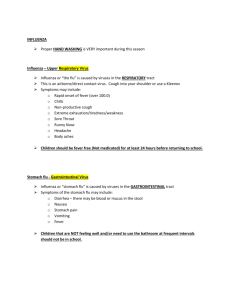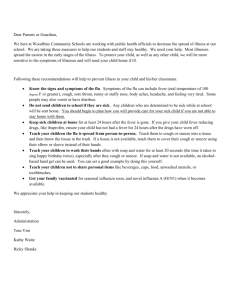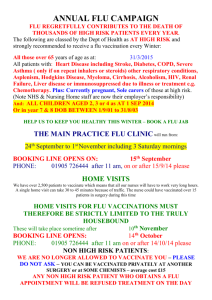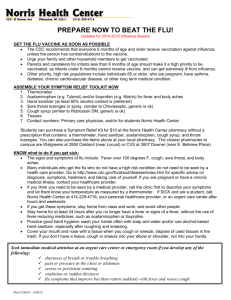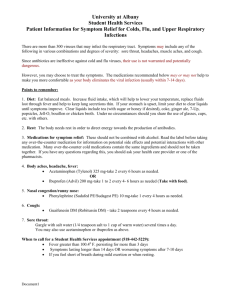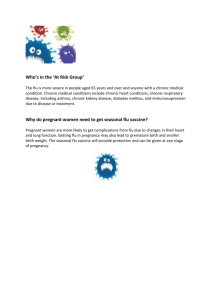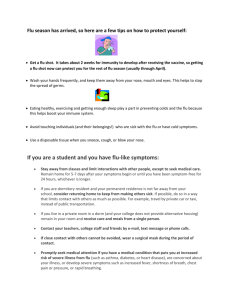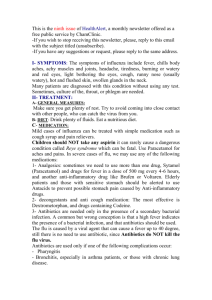Influenza - "The Flu" What To Do If You Get Sick
advertisement
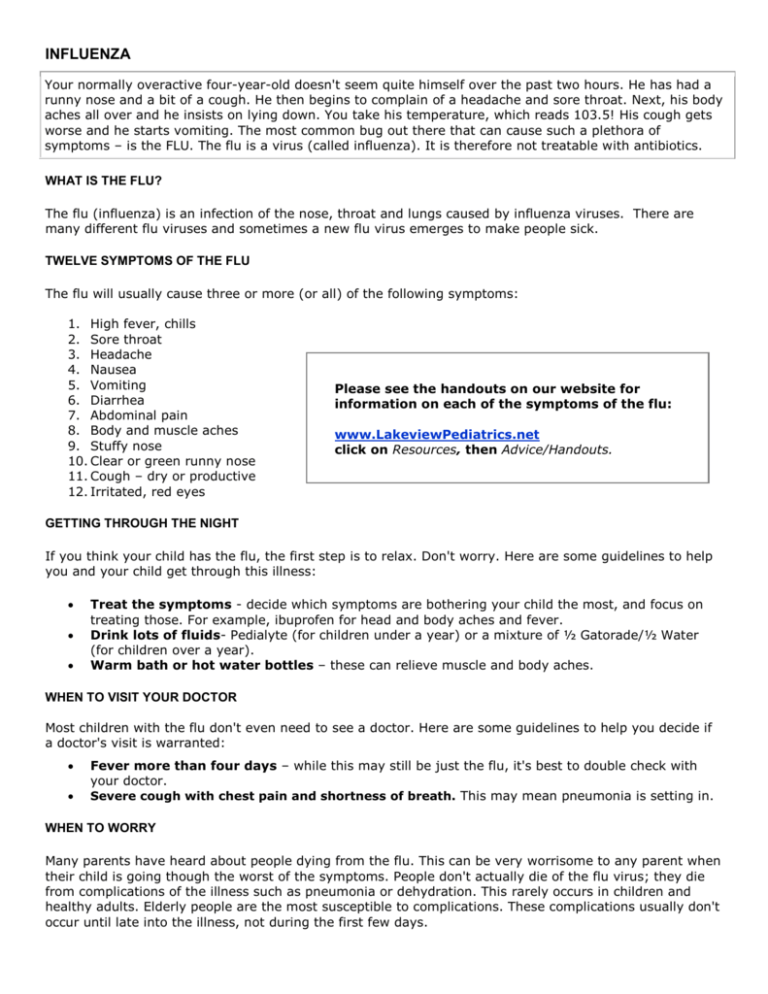
INFLUENZA Your normally overactive four-year-old doesn't seem quite himself over the past two hours. He has had a runny nose and a bit of a cough. He then begins to complain of a headache and sore throat. Next, his body aches all over and he insists on lying down. You take his temperature, which reads 103.5! His cough gets worse and he starts vomiting. The most common bug out there that can cause such a plethora of symptoms – is the FLU. The flu is a virus (called influenza). It is therefore not treatable with antibiotics. WHAT IS THE FLU? The flu (influenza) is an infection of the nose, throat and lungs caused by influenza viruses. There are many different flu viruses and sometimes a new flu virus emerges to make people sick. TWELVE SYMPTOMS OF THE FLU The flu will usually cause three or more (or all) of the following symptoms: 1. High fever, chills 2. Sore throat 3. Headache 4. Nausea 5. Vomiting 6. Diarrhea 7. Abdominal pain 8. Body and muscle aches 9. Stuffy nose 10. Clear or green runny nose 11. Cough – dry or productive 12. Irritated, red eyes Please see the handouts on our website for information on each of the symptoms of the flu: www.LakeviewPediatrics.net click on Resources, then Advice/Handouts. GETTING THROUGH THE NIGHT If you think your child has the flu, the first step is to relax. Don't worry. Here are some guidelines to help you and your child get through this illness: Treat the symptoms - decide which symptoms are bothering your child the most, and focus on treating those. For example, ibuprofen for head and body aches and fever. Drink lots of fluids- Pedialyte (for children under a year) or a mixture of ½ Gatorade/½ Water (for children over a year). Warm bath or hot water bottles – these can relieve muscle and body aches. WHEN TO VISIT YOUR DOCTOR Most children with the flu don't even need to see a doctor. Here are some guidelines to help you decide if a doctor's visit is warranted: Fever more than four days – while this may still be just the flu, it's best to double check with your doctor. Severe cough with chest pain and shortness of breath. This may mean pneumonia is setting in. WHEN TO WORRY Many parents have heard about people dying from the flu. This can be very worrisome to any parent when their child is going though the worst of the symptoms. People don't actually die of the flu virus; they die from complications of the illness such as pneumonia or dehydration. This rarely occurs in children and healthy adults. Elderly people are the most susceptible to complications. These complications usually don't occur until late into the illness, not during the first few days. These situations that might necessitate a call to your doctor or a visit to the ER during the night: High fever – most high fevers don't require a call to your doctor after hours. If the fever is over 105.0 F or doesn’t come down a degree or 2 within an hour of giving fever reducers, your child's fever warrants a call to the doctor. Dehydration – most children will get mild to moderately dehydrated during the flu. If your child has not urinated in 6-8 hours, is not alert and responsive, or has severe or persistent vomiting, your child may be severely dehydrated and need a call to the doctor or ER visit. Severe headaches with stiff, painful back-of-the-neck and persistent vomiting. These could be symptoms of meningitis. Respiratory distress - fast breathing or trouble breathing or bluish or gray skin color. You have a gut feeling that your child is unusually ill, not waking up or not interacting or being so irritable that the child does not want to be held, or crying inconsolably for greater than an hour (after Tylenol or Motrin is given). For all families, infection control is an important way to prevent becoming ill from the flu virus. Follow these tips: Wash hands or use alcohol hand solutions after being in public or around anyone with a cold or the flu. When coughing or sneezing, turn head and cough or sneeze into a disposable tissue; dispose promptly. If no tissue is available, cough or sneeze into the inside of your elbow. Don't take young children or those with immune system problems into large crowds unnecessarily when the flu is in your community. Avoid close contact (holding, kissing) between infants and anyone who has a cold or the flu. Stay home from work or school if you have the flu (fever, muscle aches, cough). Do not share things that go into the mouth-drinking cups, straws, etc. Frequently clean commonly touched surfaces (door knobs, refrigerator handle, phone, water faucets) if someone in your house has a cold or the flu. Do not smoke around children. How does flu spread? Most types of flu are thought to spread mostly from person to person through the coughs and sneezes of people who are sick with influenza. People may also get sick by touching something with flu viruses on it and then touching their mouth or nose. Can my child go to school, day care or camp if he/she is sick? No. Your child should stay home to rest and avoid giving the flu to other children. When can my child return to school after having the flu? Keep your child home from school, day care or camp for at least 24 hours after their fever is gone, without the use of a fever-reducing medicine. A fever is defined as a temperature over 99.5 under the arm, 100 orally, or 100.4 rectally. How long can a sick person spread the flu to others? People infected with seasonal flu may be able to infect others from 1 day before getting sick to 5-7 days after. This can be longer in some people, especially children and people with weakened immune systems. Is there a vaccine to protect my child from the flu? A vaccine against seasonal flu is available every fall and winter. This year, the flu vaccine includes protection against H1N1 flu as one of the three strains it covers. More information about the influenza vaccine is available on the CDC website: www.cdc.gov.

